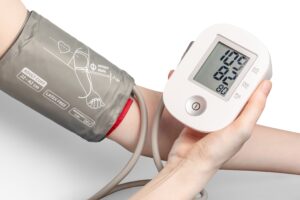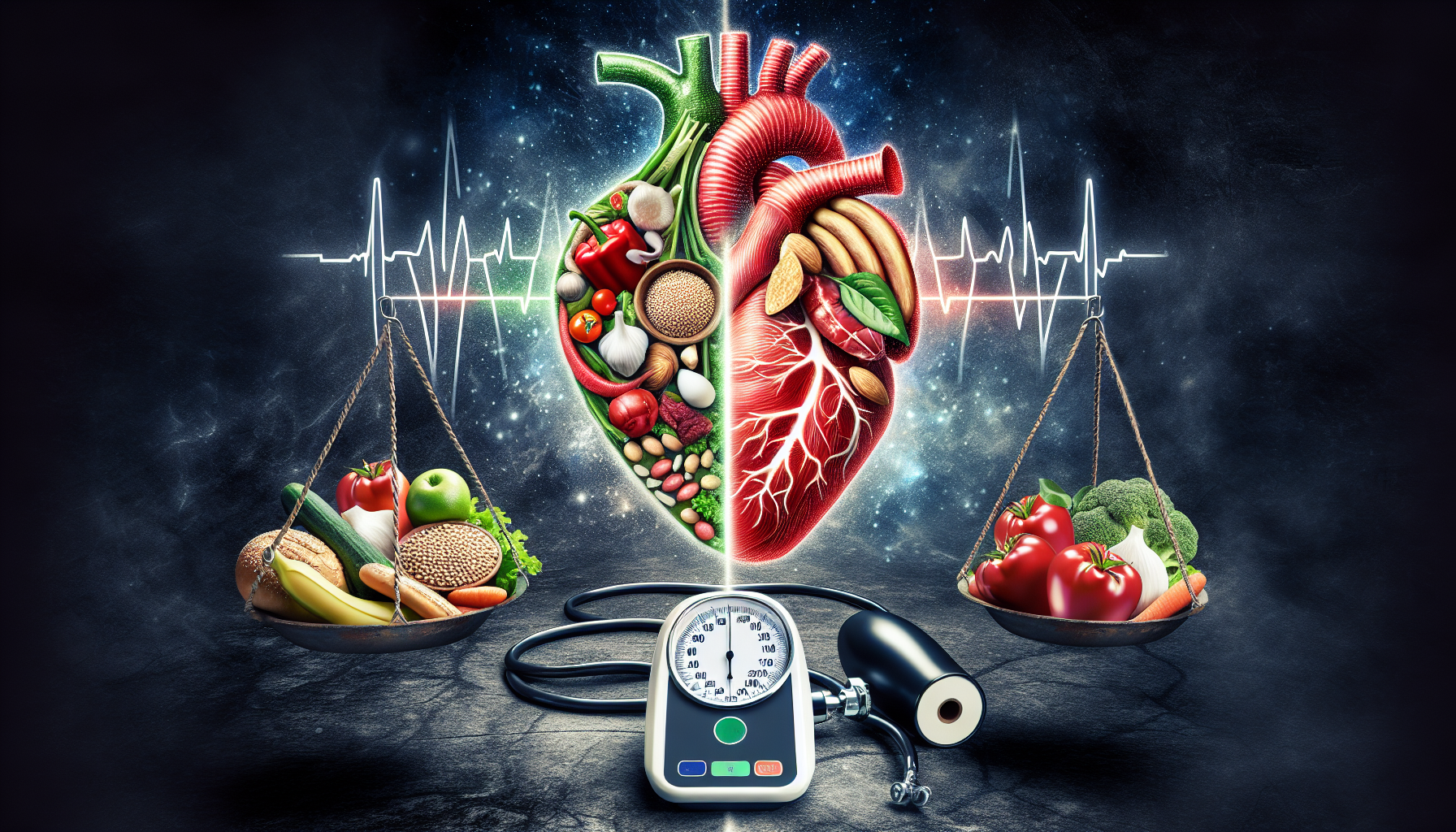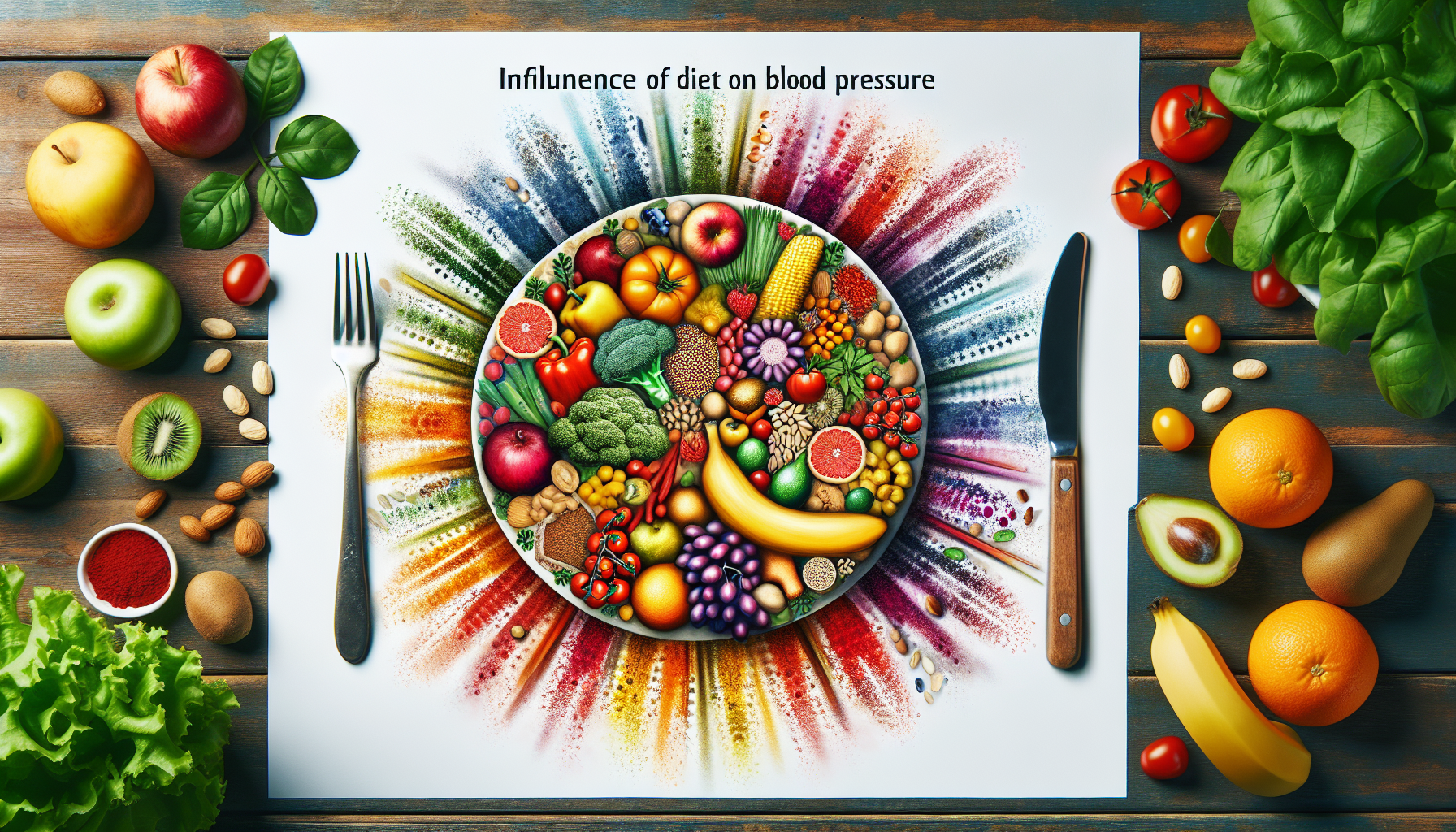Are you curious about how your diet can impact your blood pressure? Recent scientific studies have delved into this fascinating relationship, shedding light on the profound influence that our food choices can have on our overall health. In one study published in the Journal of the American College of Cardiology, researchers found that a plant-based diet rich in fruits, vegetables, and whole grains can significantly lower blood pressure levels. Another study published in the American Journal of Hypertension highlighted the potential benefits of reducing sodium intake through a low-salt diet. These studies provide compelling evidence supporting the notion that what we eat plays a vital role in maintaining healthy blood pressure levels.

Discover the Ultimate Weight Loss Secrets Here!
1. Effect of Salt Intake
1.1 Impact of High Salt Intake
The amount of salt you consume can have a significant impact on your blood pressure. High salt intake is associated with an increased risk of hypertension, also known as high blood pressure. When you consume too much salt, it can cause your body to retain water, which increases blood volume and puts more pressure on your blood vessels. This extra pressure can lead to higher blood pressure levels.
Several recent scientific studies have examined the relationship between salt intake and blood pressure. One such study, known as the INTERSALT Study, involved over 10,000 participants from various countries. The study found that there was a consistent positive association between salt intake and blood pressure. Higher salt intake was associated with higher blood pressure levels, highlighting the importance of controlling salt consumption for maintaining healthy blood pressure.
1.2 Recommended Salt Intake
To maintain a healthy blood pressure, it is recommended to limit your daily salt intake. The American Heart Association (AHA) recommends consuming no more than 2,300 milligrams (mg) of sodium per day, which is equivalent to about one teaspoon of salt. However, for individuals with hypertension or those at risk, the AHA suggests further reducing sodium intake to 1,500 mg per day.
Reducing salt intake can be achieved by watching your food choices and paying attention to the sodium content in packaged and processed foods. Fresh fruits and vegetables, whole grains, lean proteins, and low-sodium options are preferred when trying to control your salt intake.
1.3 Study: The INTERSALT Study
The INTERSALT Study, mentioned earlier, played a crucial role in understanding the impact of salt intake on blood pressure. Researchers collected data from 52 international centers and analyzed the salt intake and blood pressure levels of the participants. The study found a consistent positive association between salt intake and blood pressure, emphasizing the need to reduce salt consumption for maintaining healthy blood pressure levels.
2. Influence of Potassium
2.1 Role of Potassium in Blood Pressure Regulation
In addition to reducing salt intake, increasing your potassium intake can have a positive effect on your blood pressure. Potassium is an essential mineral that helps balance the effects of sodium in your body. It helps relax the walls of blood vessels, which can lower blood pressure. Studies have shown that higher potassium intake is associated with lower blood pressure levels.
Dietary sources of potassium include fruits, vegetables, legumes, and dairy products. Bananas, oranges, spinach, and potatoes are some examples of foods rich in potassium that can be included in your diet.
2.2 Dietary Sources of Potassium
To ensure an adequate intake of potassium, it is recommended to consume at least 3,500 to 4,700 mg of potassium per day. However, it is important to note that individuals with certain medical conditions, such as kidney disease, may need to limit their potassium intake. It is advisable to consult with a healthcare professional to determine the appropriate amount of potassium for your specific needs.
2.3 Study: The DASH Diet
The DASH (Dietary Approaches to Stop Hypertension) diet is a well-known eating plan that emphasizes consuming foods rich in potassium, among other essential nutrients. A study investigating the effects of the DASH diet on blood pressure, known as the DASH Trial, found that individuals who followed the DASH diet had significant reductions in blood pressure. This study further supports the role of potassium-rich foods in blood pressure regulation.
Click Here for Proven Fat-Burning Strategies!
3. The DASH Diet
3.1 Overview of the DASH Diet
The DASH diet is a balanced eating plan that focuses on reducing sodium and increasing nutrient-rich foods. It is designed to help lower blood pressure and prevent hypertension. The diet encourages the consumption of fruits, vegetables, whole grains, lean proteins, and low-fat dairy products, while limiting high-sodium foods, added sugars, and saturated fats.
3.2 Recommended Foods and Nutrients
The DASH diet emphasizes the inclusion of the following foods and nutrients, which have been shown to have beneficial effects on blood pressure:
- Fruits and vegetables: Aim for several servings of fruits and vegetables each day, as they are rich in potassium, magnesium, and fiber, all of which play a role in blood pressure regulation.
- Whole grains: Opt for whole grain products like brown rice, whole wheat bread, and oats, as they contain more fiber and nutrients compared to refined grains.
- Lean proteins: Choose lean sources of protein such as skinless poultry, fish, beans, and nuts, to reduce saturated fat intake.
- Low-fat dairy products: Include low-fat or non-fat dairy products in your diet, as they are excellent sources of calcium, which has been linked to lower blood pressure levels.
3.3 Study: The OmniHeart Study
The OmniHeart Study examined the effects of three different macronutrient diets within the framework of the DASH diet on blood pressure levels. This study found that all three variations of the DASH diet, which were high in either protein, unsaturated fat, or carbohydrates, were effective in reducing blood pressure. This highlights the importance of overall nutrient balance and adherence to the DASH diet principles for managing blood pressure.
4. Role of Calcium
4.1 Calcium and Blood Pressure
Calcium is not only important for maintaining strong bones and teeth but also plays a role in regulating blood pressure. Adequate calcium intake has been associated with lower blood pressure levels. Calcium helps relax blood vessel walls and supports proper muscle contraction, including the heart muscle. Studies have shown that individuals who consume higher amounts of dietary calcium tend to have healthier blood pressure levels.
4.2 Dietary Sources of Calcium
Including calcium-rich foods in your diet can contribute to your overall calcium intake. Dairy products such as milk, yogurt, and cheese are excellent sources of calcium. If you are lactose intolerant or prefer non-dairy alternatives, fortified plant-based milks and calcium-rich foods like tofu, kale, and broccoli can be viable options.
To meet the recommended daily intake of calcium (around 1,000 to 1,200 mg for adults), aim for three servings of low-fat or non-fat dairy products or suitable alternatives per day.
4.3 Study: The Dietary Approaches to Stop Hypertension (DASH) Trial
The DASH Trial, previously mentioned, also investigated the effects of calcium on blood pressure within the context of the DASH eating plan. The trial found that increasing dietary calcium intake, in addition to following the DASH diet, resulted in further reductions in blood pressure. This suggests that calcium, in combination with other nutrients, can have a positive impact on blood pressure regulation.

5. Impact of Magnesium
5.1 Magnesium and Hypertension
Magnesium is an essential mineral that plays a role in numerous biochemical processes in the body, including blood pressure regulation. Studies have suggested that a higher magnesium intake is associated with lower blood pressure levels. Magnesium helps relax blood vessel walls and improves blood flow, which can help reduce blood pressure.
5.2 Dietary Sources of Magnesium
To increase your magnesium intake, focus on consuming foods that are rich in this mineral. Some examples of dietary sources of magnesium include leafy green vegetables (like spinach and kale), nuts, seeds, whole grains, and legumes. Incorporating these foods into your diet can contribute to maintaining healthy blood pressure levels.
The recommended daily intake of magnesium varies depending on age and gender. Generally, adult men should aim for about 400-420 mg per day, while adult women should aim for around 310-320 mg per day.
5.3 Study: The Framingham Offspring Study
The Framingham Offspring Study investigated the association between magnesium intake and hypertension. The study observed that higher magnesium intake was associated with a lower risk of developing hypertension over a long-term follow-up. These findings highlight the potential benefits of adequate magnesium intake in maintaining healthy blood pressure levels.
6. Influence of Omega-3 Fatty Acids
6.1 Omega-3 Fatty Acids and Blood Pressure
Omega-3 fatty acids, primarily found in fatty fish like salmon, mackerel, and sardines, have been linked to a variety of health benefits, including the maintenance of healthy blood pressure levels. These fatty acids help reduce inflammation, improve heart health, and promote healthy blood vessel function.
Several studies have explored the relationship between omega-3 fatty acids and blood pressure. While individual results may vary, overall, there is evidence to suggest that regular consumption of omega-3 fatty acids can contribute to lower blood pressure levels.
6.2 Dietary Sources of Omega-3 Fatty Acids
To increase your omega-3 fatty acid intake, aim to include fatty fish in your diet at least twice a week. If you are not a fan of fish or prefer plant-based options, other sources of omega-3 fatty acids include flaxseeds, chia seeds, walnuts, and algae-based supplements.
6.3 Study: The DASH-Sodium Trial
The DASH-Sodium Trial investigated the effects of different dietary approaches, including the DASH diet and sodium reduction, on blood pressure levels. The trial found that individuals who followed the DASH diet, which includes omega-3 rich foods like fish, experienced significant reductions in blood pressure. This suggests that the DASH diet, in combination with omega-3 fatty acids, can have a positive impact on blood pressure regulation.
7. The Mediterranean Diet
7.1 Overview of the Mediterranean Diet
The Mediterranean diet is an eating pattern inspired by the traditional dietary habits of countries bordering the Mediterranean Sea. It has gained recognition for its potential cardiovascular health benefits, including its impact on blood pressure.
The Mediterranean diet emphasizes the consumption of fruits, vegetables, whole grains, legumes, olive oil, nuts, seeds, and moderate amounts of fish, poultry, and dairy products. Red meat, processed foods, and sweets are typically limited in this eating pattern.
7.2 Benefits for Blood Pressure
Numerous studies have demonstrated that following a Mediterranean diet is associated with lower blood pressure levels. The diet’s emphasis on whole foods, healthy fats, and plant-based sources of protein may contribute to this effect. The Mediterranean diet is also known for its high content of antioxidants and anti-inflammatory compounds, which can promote heart health and reduce the risk of hypertension.
7.3 Study: The PREDIMED Study
The PREDIMED (Prevención con Dieta Mediterránea) Study, a large randomized controlled trial, investigated the effects of the Mediterranean diet on cardiovascular outcomes, including blood pressure. The study found that individuals assigned to the Mediterranean diet group had significantly lower blood pressure compared to the control group. This study provides strong evidence for the blood pressure-lowering potential of the Mediterranean diet.
8. Effect of Caffeine
8.1 Impact of Caffeine on Blood Pressure
Caffeine, a naturally occurring stimulant found in coffee, tea, energy drinks, and some medications, can have both short-term and long-term effects on blood pressure. In the short term, consuming caffeine can cause a temporary increase in blood pressure, although the magnitude of this effect may vary among individuals. However, the long-term impact of caffeine on blood pressure is less clear.
8.2 Dietary Sources of Caffeine
Common dietary sources of caffeine include coffee, tea, energy drinks, chocolate, and some carbonated beverages. It is important to pay attention to your caffeine consumption, as excessive amounts can potentially contribute to higher blood pressure levels.
8.3 Study: The DASH Diet and Caffeine Study
The DASH Diet and Caffeine Study explored whether caffeine intake influences the blood pressure-lowering effects of the DASH diet. The study found that while caffeine intake can temporarily raise blood pressure, it does not negate the beneficial effects of the DASH diet on blood pressure reduction. This suggests that moderate caffeine consumption does not significantly interfere with the blood pressure-lowering potential of a healthy eating plan.

9. Alcohol Consumption
9.1 Relationship between Alcohol and Blood Pressure
Alcohol consumption can have both positive and negative effects on blood pressure. Moderation is key when it comes to alcohol intake, as excessive consumption can lead to an increase in blood pressure and various health complications.
In small to moderate amounts, alcohol may have a modestly beneficial effect on blood pressure, primarily due to the presence of certain compounds like polyphenols in certain alcoholic beverages. However, it is crucial to note that the potential benefits can vary depending on individual factors and should be weighed against the potential negative effects of alcohol.
9.2 Recommended Alcohol Consumption
If you choose to consume alcohol, it is recommended to do so in moderation. Moderate alcohol consumption is defined as up to one drink per day for women and up to two drinks per day for men. It is important to note that some individuals should refrain from alcohol consumption altogether, especially those with certain medical conditions or who take medications that interact with alcohol.
9.3 Study: The Moderate Alcohol and Cardiovascular Health Trial
The Moderate Alcohol and Cardiovascular Health Trial investigated the effects of moderate alcohol consumption on cardiovascular health, including blood pressure levels. The trial found that individuals who consumed alcohol in moderation experienced a slight reduction in blood pressure. However, it is essential to prioritize overall health and consider individual factors when making decisions about alcohol consumption.
10. Role of Fiber
10.1 Fiber and Hypertension
Dietary fiber, primarily found in plant-based foods, has been associated with numerous health benefits, including the maintenance of healthy blood pressure levels. Fiber helps regulate blood sugar levels, promote healthy digestion, and may contribute to lower blood pressure.
10.2 Dietary Sources of Fiber
To increase your fiber intake, focus on consuming a variety of fruits, vegetables, whole grains, legumes, nuts, and seeds. These foods are rich in fiber and can help you meet the recommended daily intake of fiber, which is around 25 grams for women and 38 grams for men.
10.3 Study: The Dietary Approaches to Stop Hypertension (DASH) Trial
The DASH Trial, mentioned earlier, also investigated the effects of fiber on blood pressure within the context of the DASH eating plan. The trial found that a high-fiber diet, in combination with other dietary factors emphasized by the DASH diet, was effective in reducing blood pressure. This highlights the importance of fiber-rich foods in the management of blood pressure.

